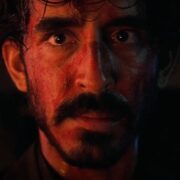KRISHA: A Deeply Personal Story About Addiction
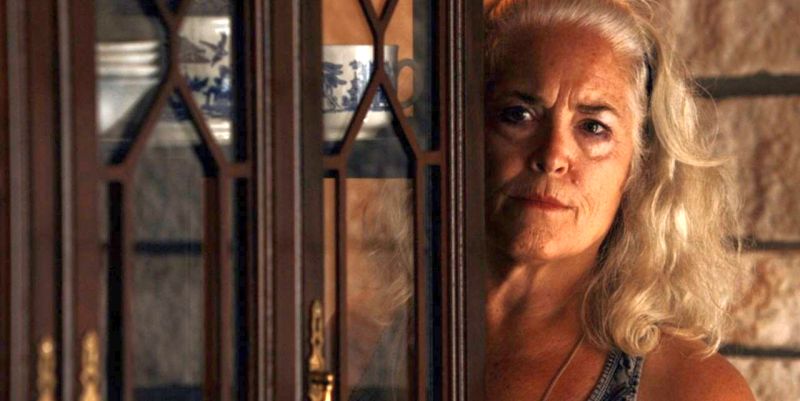
Becky spends her days working in TV and she spends…
The opening of Trey Edward Shults’ Krisha is intense. A few seconds in, we are staring eye to eye with Krisha, the titular character (Krisha Fairchild). She is looking at us, and we are looking right back. This defiant, unbroken gaze is prevalent throughout the film, but nowhere more so than in this establishing shot. It’s hard to maintain eye contact with someone who knows you are watching her and is asking why. Therein lies the essence of Krisha. Looking at things that maybe we find uncomfortable. Things that maybe, we would rather not watch.
The ‘coming home’ narrative is simple and one which we have seen many times before. Krisha is a recovering alcoholic returning home to her intimate and extended family for Thanksgiving. The film takes place over the afternoon and evening of her return. The film explores the varying levels of emotions from the family members about Krisha’s return (notably her sister Robyn) but focuses closely in on Krisha’s own feelings about her abandonment and addiction. From the very beginning of the film, Shults closes in on Krisha; the camera, sound and visual design reflecting every part of the torment she is about to put herself through.
Fact/Fiction
To say that Krisha is a personal film for Shults to have made is a pretty huge understatement. Inspired by a short film made by Shults in 2014, the cast of Krisha are made up from various members of Shults’ immediate family – including himself. Krisha Fairchild is Schults’ real life aunt, Robyn Fairchild (Krisha’s sister) is Shults‘ own mother. Billie Fairchild, Shults‘ grandmother, gives a phenomenal performance as Krisha’s mother.
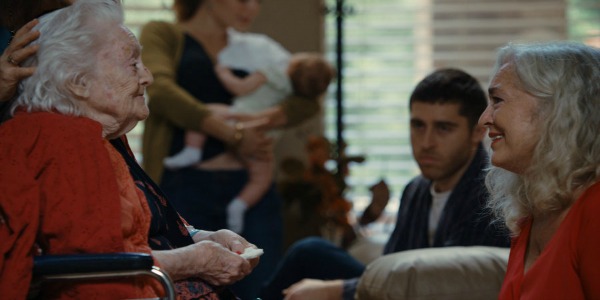
Shults himself plays the character of Trey, Krisha’s estranged son. Krisha was also shot over a period of nine days using Shults’ parents house as the location. What could easily have turned into a semi-therapeutic, semi-egocentric film about Shults‘ own life and family successfully evades these potholes and instead engages the audience with its unique style and take on the horror of addiction.
Owing in part to the deeply personal casting of the film, the on-screen chemistry between these characters is particularly strong. One of the most emotional sequences is the exchange between Krisha and her mother. Though never explicitly stated, the implication is that the two haven’t seen in each other a number of years. The simple, yet natural dialogue feels incredibly realistic; so much so that it is hard to imagine that the film was scripted at all.
The border between what is real and what is not gives Krisha a slightly unusual edge. The casting and setting blurs the lines between fact and fiction, which allows us to empathise fully with Krisha as a character. The films themes (addiction and recovery) were partly inspired by a cousin who overdosed following a family reunion which feels incredibly close to home considering the events which transpire during Krisha.
Character Over Narrative
Whilst Shults uses long takes and intricate production design to throw us deep into Krisha’s mental state, the immersion goes deeper than this. The whole film is not constructed to give us any sense of a real narrative, but to understand Krisha and what is going on. Her character, her addiction, is woven into the very structure of the film. It’s a fantastic portrayal of addiction because we cannot separate Krisha from her addiction. We can’t find where she begins and it ends.
Though there are hints of a sequential narrative, Krisha uses montage editing throughout. The result is an uncertainty about the order of events as they unfold, and a certain confusion as to what has transpired. The events in Krisha take place in just one evening – but we are never entirely sure at what point in the evening we are. One of the most revealing conversations occurs between Doyle (Bill Wise) and Krisha on the back porch.
What begins as a friendly reconciliation turns into accusations and cruel jibes from Doyle. Whilst this is only one conversation, this scene is intercut and dispersed throughout the film. Krisha’s downwards spiral is intrinsically linked to the souring of the conversation. Through clever editing and a disregard for conventional storytelling, Shults pitches the confusion and heartbreak Krisha feels through her interactions with various different people by placing these events directly after one another.
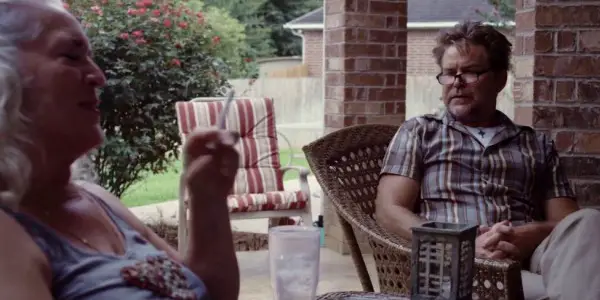
We watch in abject horror at the events unfolding in front of us. It’s akin to a car crash. Shults wants us to feel uncomfortable, and we do, but we can’t look away. Krisha spirals deeper and deeper into the rabbit hole, and the film becomes more fragmented. The slow-motion turkey shot becomes the climax of the film as it is the catalyst for everything that comes afterwards. Shults lets the shot play out in its entirety. There is no hurry to move on or to cut to the reactions of the other family members in the room. It is a brave move, but completely encompasses Shults style as a director. Just watch, and take it in.
Poignant & Powerful
One of the reasons why Krisha works so well as a portrait of a flawed person, is just how believable Krisha Fairchild is within the role. Fairchild manages to negotiate the different sides of Krisha’s personality; from the fear of having failed as a mother, to the need to become a peaceful person. She balances these traits with the destructive hurricane that Krisha becomes once she begins drinking.
Despite the dramatic scene at the dinner table, Krisha never feels melodramatic or staged – and this is due to Fairchild’s understated performance. Credit must also be given to non-actor Robyn Fairchild, Krisha’s sister, who gives a heartbreaking monologue pleading with Krisha to understand why people are upset about her behaviour.
The film gets to the heart of how it feels to try and recover from an addiction. The process is not romanticized nor is it simplified to make it easier for viewers to understand. Krisha’s behaviour is confusing to us because Shults wants us to realise that we can’t really understand her or what she is going through. Through the camerawork and visuals we can begin to piece bits together but in the end, the reality is that addiction is awful and you can’t dress it up any other way. That’s what Krisha does really well.
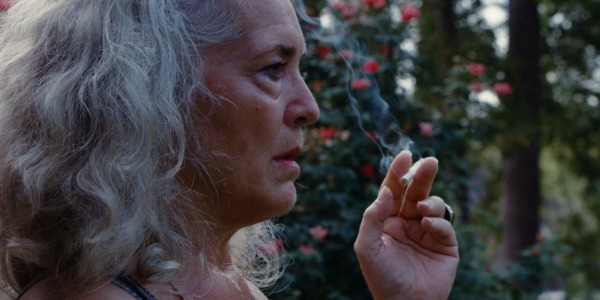
There were a few moments which Krisha could have done without. Krisha’s phone call to Richard – whilst an interesting insight into where Krisha was at – just made me question who exactly Richard was. We never get an answer for this, and I felt my attention was directed towards that rather than towards the situation in hand. Whilst Krisha and Doyle’s conversation is revealing and one of the most dynamic scenes in the film, there seemed to be another level to the conversation which concerned Doyle and Robyn’s relationship. It feels as if Shults is trying to make a point about everyone having their own struggles to deal with, but there’s a strong sense that this film really isn’t about that. It’s about Krisha.
A Not So Happy Ending
At a short running time of only 80 minutes, Krisha left me wanting more. I wanted to know what happens to Krisha now, how the family are going to react and what this means for their relationships with one another. Wrapping up and concluding this episode is not in the nature of the film nor the the subject matter itself. It’s a tough ending to swallow, but a truthful one too. Krisha is a truly unique film, and one that I’ll be thinking about for weeks.
What do you think about how Krisha has blended reality and fiction in its casting and setting?
Krisha is out on the 18th March in the US and is yet to set a release date for the rest of the world.
https://www.youtube.com/watch?v=GcT39dmF-SIDoes content like this matter to you?
Become a Member and support film journalism. Unlock access to all of Film Inquiry`s great articles. Join a community of like-minded readers who are passionate about cinema - get access to our private members Network, give back to independent filmmakers, and more.
Becky spends her days working in TV and she spends every other minute writing about cinema, TV & feminism. Based in London, she also likes drinking gin, re-watching 'The X Files' and writing about on-screen representation and all manner of things over at femphile.com













